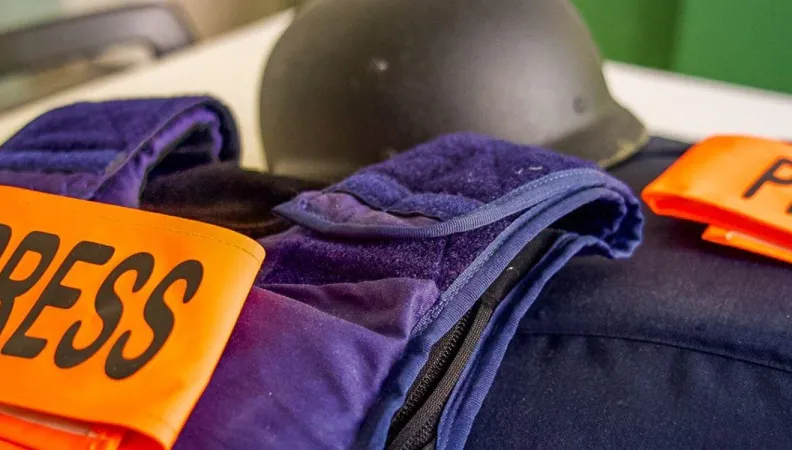Share the page
AFD and Reporters without Borders: Defending Journalists…and Journalism
Published on

At a time when the right to publish, write and speak freely are being repeatedly attacked, World Press Freedom Day on May 3, is an opportunity to take stock of initiatives aimed at protecting journalists and the work they do. AFD has strengthened its partnership with Reporters without Borders, to support the NGO in its mission to defend journalists and journalism.
Free access to reliable and quality information is deteriorating in a number of places around the world. Yet false information and propaganda have proliferated following the outbreak of Covid-19, the war in Ukraine, and armed conflict and forced displacement in the Sahel. In other countries, from Latin America to Europe and Asia, governments and armed groups have used violence and intimidation to suppress and control media outlets, and the narratives they produce.
Sixty-seven members of the media were killed in 2022, a 50% rise on the previous year. As a result of the murder, repression, and imprisonment of journalists, a growing number of citizens are being deprived of information essential to the survival of democracy. According to Unesco’s World Trends in Freedom of Expression and Media Development: Global Report 2021/2022, 85 per cent of the world’s population experienced a decline in press freedom in their country over the past five years.
Further reading: How AFD Contributes to Freedom of Information
In an effort to counter these trends, AFD and Reporters Without Borders signed a multi-year partnership agreement, last November, which is being implemented in 66 countries on four continents. In the first initiative of its kind, the €8 million invested, of which AFD has contributed €5.6 M, will allow for a wide range of journalistic support. The financing helps support some 18 local organizations, provides safety training and equipment for journalists and the means to conduct fact-checking and investigate dubious sources of information.
Development needs reliable information
“These issues are fundamental for AFD,” says Emilie Aberlen, social change specialist with AFD’s Civil Society Organizations Division. “Understanding, dealing with and intervening in development issues implies having relevant indicators in our countries of intervention, and therefore having access to reliable and quality information. The effectiveness of our action depends on it.”
AFD contributes to advocacy and campaigns for the protection of journalists and for their right to work freely. “Our funds also allow for the deployment of information regulation initiatives, such as the Journalism Trust Initiative (JTI), which has reached more than 600 media since its creation in 2019,” adds Aberlen.
The JTI establishes indicators of reliability of information and media. Another example is the Initiative on Information and Democracy (I&D), which aims to implement democratic guarantees in the global communication and information space, in the era of the surge of fake news.
Further reading: Fighting Fake News in the Middle East
Press freedom strikes back
Neutral, reliable journalism is also being threatened by the rising concentration of media resources in just a few hands. While global newspaper advertisement revenue has dropped by two-thirds over the past decade, growing numbers of media outlets have been forced to cut down on staff or close their doors permanently. Just two companies, Google and Meta, now receive approximately half of all global digital advertising spending.
“We observe that the journalist, in a globalized world governed by algorithms, search engines and soon, artificial intelligence, has less and less weight,” says Antoine Bernard, Director of Advocacy at RSF. “Yet [journalism plays] a fundamental social and democratic function. The acceleration of crises, repression and draconian laws around the world obliges to go beyond the defensive, beyond just countering the consequences” [of this crisis in journalism].
By strengthening of RSF's international network, this partnership also allows the NGO the agility to address some of the crises unfolding around the world. “In Afghanistan, where 50% of the country's media have been closed since August 2021, we can extract and provide emergency aid to journalists under threat,” says Diana Guzman, Director of RSF’s international network.
The program will also back efforts to liberate trapped and imprisoned journalists.
“We are also campaigning there for the release of the Franco-Afghan journalist Mortaza Behboudi, arrested on January 7 in Kabul while he was just doing his job," adds Guzman. "We are doing the same in the Sahel, where we were able to finance the campaign for the release of journalist Olivier Dubois.”
Towards a journalistic “New Deal”
In Ukraine, where a rising number of journalists have been killed during Russia’s invasion, the stakes are just as high. The RSF-AFD partnership has provided the reporters’ organization the means to support local journalistic production despite the ongoing conflict. “We have been able to open two centers for press freedom, in Kyiv and Lviv, which allow journalists to continue their activities,” says Diana Guzman. “We have provided helmets and bulletproof vests for more than 700 journalists, as well as psychological support and training to ensure their safety.” Crimes committed against journalists are also constantly monitored and investigated.
In addition, RSF is now able to finance the maintenance of local media, particularly those at risk. "There is a critical subject of editorial sustainability,” says Diana Guzman. “We are supporting 35 media outlets in danger, at a time when the market for advertisers has collapsed."
In the near future, the NGO aims to allow exiled journalists to counter pro-Kremlin propaganda thanks to the French satellite Eutelsat, and AFD financing will help it offer a range of independent international Russian-speaking channels. The NGO also aims in 2023 to change international governance on the Internet, and to develop a "New Deal" for journalism, and to go on the offensive against Russian and Chinese propaganda.
